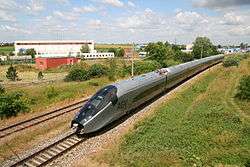High-speed rail in the Czech Republic
High-speed rail in Czech Republic is at planning stage only. Even though České Dráhy own and operate multiple rolling stock capable of speeds of 200 km/h (124 mph), other than Velim railway test circuit there is no infrastructure capable of speeds over 160 km/h (99 mph). Czech rolling stock manufacturer Škoda Transportation produces high-speed rolling stock on regular basis.
Infrastructure

The Czech Ministry of Transport is planning a high-speed rail network which will be roughly 660 km (410 mi) long.[1] Several studies of a possible network have been completed, but there have not yet been any concrete proposals.[2] There are no expectations for any operation before 2020, but Czech railway infrastructure manager (Správa železniční dopravní cesty, SŽDC) has a special budget for preparatory studies. There is also promotion from the side of NGOs, e.g. Centrum pro Efektivní Dopravu.[3]
SŽDC is also considering upgrading of some ETCS-equipped 160 km/h (99 mph) tracks to 200 km/h (124 mph) and also upgrading some current 160 km/h (99 mph) projects to 200 km/h (124 mph).[4]
The Velim railway test circuit contains a large 13.3-kilometre track with a maximum allowed speed of 230 km/h (143 mph) for tilting trains and up to 210 km/h (130 mph) for conventional trains.[5]
Rolling stock operated in the Czech Republic
.jpg)
Since 2004 České dráhy have been operating seven ČD Class 680 sets. These Pendolino-based trains are capable of operating at 230 km/h (143 mph) and were intended for operation on Berlin - Prague - Vienna route.[6] While testing from Břeclav to Brno on November 18, 2004, the ČD Class 680 reached a speed of 237 km/h (147 mph) and created a new Czech railway speed record.[7] In reality ČD Class 680 were never operated in Germany and appeared only in Austria and Slovakia; since 2012 they have only operated on domestic routes.
From 2010 České dráhy are receiving delivery of 20 new ČD Class 380 locomotives capable of a speed of 200 km/h (124 mph), they operate also tens of passenger cars capable of that speed (classes 10-91, 21-91, 72-91 and 88-91). In 2013 České dráhy also ordered 7 Railjet trains capable of a speed of 230 km/h (143 mph).
Rolling stock manufactured in the Czech Republic

In 1974 and 1979 Škoda produced 12 Škoda 66Е locomotives capable of a speed of 200 km/h (124 mph) for the Soviet Union. These were designated as Chs200 (ЧС200) and were used mainly on the Nevsky Express train on the Moscow – Saint Petersburg Railway. The locomotives were refurbished in the 1990s and during testing in 2007 one locomotive reached a speed of 262 km/h (163 mph).[8]
Since 2008 Škoda has been producing Skoda 109E locomotives capable of a speed over 200 km/h (124 mph). The ČD Class 380 batch is certified for 220 km/h (137 mph),[9] just as future DB Class 102, however the Slovak ZSSK Class 381 batch only for a speed of 160 km/h (99 mph). Along with DB Class 102 will be delivered batch of double decker trainsets with construction speed of 200 km/h (124 mph), although legislatively limited to 189 km/h (117 mph).
References
- ↑ Objednatel: Ministerstvo dopravy ČR (2004-07-31). "KOORDINAČNÍ STUDIE VRT 2003" (PDF) (in Czech).
- ↑ Objednatel: Ministerstvo dopravy ČR (December 2006). "Studie VRT - analýza přepravních vztahů a výhledové možnosti dopravních systémů ve vybraných směrech" (PDF) (in Czech).
- ↑ Jan Sůra (2013-01-04). "Vysokorychlostní vlaky v Česku se vrací do hry. Na plány jde 45 milionů" (in Czech).
- ↑ TechNet: Česká železnice se připravuje na 200 km/h. Hrozí nám „španělská“ nehoda?
- ↑ VÚŹ: Zkušební centrum VUZ Velim
- ↑ aktuálně.cz: Plán supertratě krachl, železnice přišla o 70 miliard
- ↑ martin (2005-02-17). "Portál Pendolino.cz - 237 km/h: Nový rychlostní rekord české železnice". Retrieved 2008-02-10.
- ↑
- ↑ "Registration Details". Europa. European Railway Agency. Retrieved 1 May 2016.